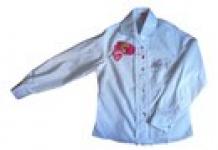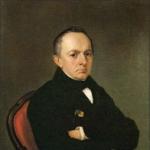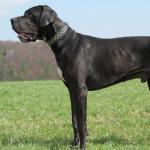Frame from the film "Sasha" (1981)
“Sashka flew into the grove, shouting “Germans! Germans!” to forestall their own.” The commander ordered to move behind the ravine, lie down there and not a step back. The Germans by that time suddenly fell silent. And the company that took up the defense also fell silent in anticipation that a real battle was about to begin. Instead, a young and somehow triumphant voice began to fool them: “Comrades! In the areas liberated by the German troops, the sowing campaign begins. Freedom and work awaits you. Drop your weapons, let's smoke cigarettes..."
A few minutes later the commander figured out their game: it was reconnaissance. And then he gave the order "forward!".
Sashka, though for the first time in the two months that he fought, came across so close to a German, but for some reason he did not feel fear, but only anger and some kind of hunting rage.
And such luck: in the very first battle, a fool, he took the “language”. The German was young and snub-nosed. The company commander chatted with him in German and ordered Sashka to take him to headquarters. It turns out that Fritz did not say anything important to the company commander. And most importantly, the Germans outwitted us: while our soldiers listened to German chatter, the Germans left, taking a prisoner from us.
None of the commanders were at the battalion headquarters - everyone was called to the brigade headquarters. And they didn’t advise Sashka to go to the battalion commander, saying: “Yesterday our Katenka was killed. When they buried, it was scary to look at the battalion commander - everything turned black ... "
Sasha decided to go to the battalion commander anyway. That Sashka with the orderly ordered to leave. Only the voice of the battalion commanders was heard from the dugout, and the German seemed not to be there. Silence, infection! And then the battalion commander called to him and ordered: the Germans - at the expense. Sasha's eyes darkened. After all, he showed a leaflet, where it is written that the prisoners are provided with life and return to their homeland after the war! And yet - he had no idea how he would kill someone.
Sasha's objections pissed off the battalion commander even more. While talking to Sasha, he unambiguously laid his hand on the handle of the TT. The order ordered to fulfill, to report on the fulfillment. And the orderly Tolik was supposed to follow the execution. But Sasha couldn't kill an unarmed man. I couldn't, that's all!
In general, we agreed with Tolik that he would give him a watch from a German, but now that he left. But Sasha decided to take the German to the brigade headquarters. This is far and dangerous - they can even consider a deserter. But let's go...
And then, in the field, the battalion commander caught up with Sasha and Fritz. He stopped, lit a cigarette ... Only the minutes before the attack were just as terrible for Sasha. The captain's gaze met directly - well, shoot, but I'm right anyway ... And he looked sternly, but without malice. He finished his cigarette and, already leaving, threw: “Take the German to the headquarters of the brigade. I cancel my order."
Sashka and two other wounded from the walkers did not receive food for the road. Only prodattestats, which can be purchased only in Babin, twenty miles from here. Toward evening, Sashka and his fellow traveler Zhora realized that they couldn’t get to Babin today.
The hostess, to whom they knocked, let her spend the night, but she said there was nothing to feed. Yes, and themselves, while walking, they saw: the villages were in desolation. There are no cattle to be seen, no horses, and there is nothing to talk about technology. It will be hard for collective farmers to spring.
In the morning, waking up early, they did not linger. And in Babin, they learned from a lieutenant, also wounded in the arm, that the produkt was here in winter. And now they have been transferred to an unknown place. And they are nezhramshi for days! Lieutenant Volodya also went with them.
In the nearest village, they rushed to ask for food. Grandfather did not agree to give or sell food, but advised: to dig up potatoes in the field, which remained from autumn, and fry the cake. Grandfather allocated a frying pan and salt. And what seemed like inedible rot was now going down the throat for a sweet soul.
When they passed by the potato fields, they saw how other crippled people were swarming there, smoking fires. They are not alone, so they feed like that.
Sasha and Volodya sat down to smoke, and Zhora went ahead. And soon there was an explosion ahead. Where? Far from the front ... They rushed along the road. Zhora was lying ten paces away, already dead: apparently, he turned off the road behind a snowdrop ...
By the middle of the day we reached the evacuation hospital. They registered them, sent them to the bathhouse. I would have stayed there, but Volodya was eager to go to Moscow - to see his mother. Sasha also decided to hit the road home, not far from Moscow.
On the way to the village fed: it was not under the Germans. But it was still hard to go: after all, they trampled a hundred miles, and the wounded, and on such grub.
We had dinner at the next hospital. When dinner was brought, the materok went along the bunks. Two spoonfuls of porridge! For this annoying millet, Volodya had a big quarrel with his superiors, so much so that a complaint about him got to the special officer. Only Sasha took the blame. What is a soldier? They won’t send the advanced forward, but it’s all the same to return there. Only the special officer advised Sasha to get out as quickly as possible. But the doctors did not let Volodya go.
Sasha went back to the field, to make potato cakes for the road. The wounded were swarming there decently: the guys did not have enough grub. And waved to Moscow. He stood there on the platform, looked around. Will I wake up? People in civilian clothes, girls knocking with their heels... as if from another world.
But the more strikingly this calm, almost peaceful Moscow differed from what was on the front line, the more clearly he saw his work there ...
retold
Among the works that truthfully tell about the terrible front-line everyday life of the Second World War is the story of the writer-front-line soldier V. Kondratyev "Sasha". There are no beautiful words praising the feat of a soldier who sacrificed his life in a terrible battle. The author does not show the valiant victories of the Soviet troops. The everyday life of a simple warrior, "who found himself in the most difficult time in the most difficult place," is the main theme of the work "Sasha" by Kondratiev. An analysis of the actions of the hero helps to understand what worried and tormented a person who was torn out of peaceful life and thrown into the very muzzle of war.
From the history of the creation of the story
Kondratiev went to the front in December 1941. As part of a rifle brigade, he took part in the fierce battles for Rzhev that unfolded in the 42nd, was wounded and awarded a medal. Impressions from those terrible years remained for life, as evidenced by the analysis of the story "Sasha". Kondratiev, who took up the pen at a fairly mature age (the story "Sashka" was published in 1979, and in the 80th its author turned 60), every night he was disturbed by dreams in which he saw comrades-in-arms from near Rzhev. He even tried to find fellow soldiers, but he did not find anyone, which gave rise to a terrible thought: “Maybe I alone survived?”
The writer admitted that he had read many works about the war, but did not find in them that which did not let go of his soul. And then he decided to talk about “his” war, otherwise some of its pages would “remain undisclosed.” From that moment, Vyacheslav Kondratiev began his literary activity.

"Sasha": a summary of the story
The action takes place in early spring. The main character, Private Sashka, has been fighting for the second month on the front line near Rzhev, but for him everything here is “as usual”. The Germans keep beating and beating, but they are bad with food (because of the thaw, even bread is not enough), and with shells, and there is nowhere to dry clothes and shoes. Military life with the smallest details looms in the story "Sashka" Vyacheslav Kondratiev. An analysis of these scenes leads to the thought of how difficult it was for a person in such conditions to remain a "Man" and not step over the laws of conscience.
- he gets boots for the company commander (not for himself!), whose pims are so thin that you can’t even dry them;
- captures a German, whom the hand never raised to shoot;
- takes on someone else's guilt and saves a young lieutenant from the tribunal;
- meets with nurse Zina and leaves her path after learning that she is in love with another.
This is the plot of the story "Sasha" by Kondratiev. An analysis of these scenes helps to understand how the hero managed to go through the prepared trials and not lose his dignity.
The capture of a German

This scene is one of the key in the work. Sasha takes the tongue with his "bare hands", as he was unarmed. And suddenly at that moment he, who had been in the most dangerous and hopeless attacks, saw in the guise of a prisoner not an enemy, but a person deceived by someone. He promised him life, since on the leaflet, picked up on the way to the headquarters, it was written that Russian soldiers did not mock the prisoners. On the way, Sashka constantly felt a sense of shame both because their defenses were useless and because their dead comrades lay unburied. But most of all, he felt awkward from the fact that he suddenly felt unlimited power over this man. Such is he, Sasha Kondratieva. An analysis of his state of mind shows why he was never able to shoot the prisoner and, as a result, violated the order of the battalion commander. Feeling right, he managed to look directly into his eyes, which is why the commander was forced to cancel his original decision to shoot "tongue". Later, Sashka thought that if he remained alive, the German captured by him would be the most memorable event of the war for him.
Here it is - one of the main qualities of a Russian warrior: always preserve humanism in yourself, remember that you are a person. This is especially emphasized in the story Kondratiev. Sashka - the analysis of the work is proof of this - was able to oppose good to evil in one of the most difficult periods of his life.
Lieutenant's defense
Another important episode is the case in the hospital, when Sashka stood up for his new acquaintance (a young lieutenant) before the special officer. They knew nothing at all, but Sashka was well aware of what could threaten a lieutenant who had a rank, a quarrel started by Vladimir. And nothing will happen to him, an ordinary soldier: they won’t send him further than the front anyway. As a result, the lieutenant remained in the hospital, and Sasha was forced to go further to Moscow himself. The desperate and ardent lieutenant in fact turned out to be weaker than the private who surpassed him in strength of spirit and courage - an analysis of the story "Sashka" by Kondratiev leads to this.

love test
During the war, Sasha met Zina. Acquaintance with her warmed his soul, since there was no one dearer to her for the hero. Vyacheslav Kondratyev conducts his hero through the traditional test of love in literature. Sashka (a summary of whose relationship with his girlfriend fits into several scenes) behaves with dignity here too: the ability to understand another person and spiritual kindness are stronger.
At first, he looks forward to meeting the girl, and when she took place, he finds out that Zina has a new love. Sasha is experiencing deep disappointment at this moment. This is also a misunderstanding of how you can have a party when there, on the front line, all the fields are “ours”. This is the pain from the fact that she preferred Sasha to another. But he just leaves, without reproaching Zina for anything and without demanding any explanation from her.
So what is he, Sasha Kondratieva?
Analysis of the story and actions of the protagonist helps to understand the most important thing that the author wanted to convey to the reader: it is possible to go through the terrible trials of the war and keep the Man in oneself. He emphasizes this with a phrase belonging to Sasha: “We are people, not fascists.” And these soldiers were the majority. Many front-line soldiers saw their comrades in the image of a hero. And this means that just such warriors won the victory, including V. Kondratiev himself, Sashka.

Analysis of the work helps to recreate the image of a Russian soldier: courageous, hardy, who managed to maintain humanism, faith in victory.
Vyacheslav Leonidovich Kondratiev was born on October 30, 1920 in Poltava in the family of a railway engineer. From 1922 he lived in Moscow. In 1939 he entered the Moscow Road Institute, was drafted into the army, served in the Far East.
In 1942-1944 - at the front, participated in heavy protracted battles, including near Rzhev, was commissioned after being wounded. After the war, he worked as an artist, studied at the Polygraphic Institute (Department of artistic design of printed materials).
Kondratiev died in Moscow on September 23, 1993 (he committed suicide due to a serious illness).
The path to literature of Vyacheslav Leonidovich Kondratiev, like that of every great writer, turned out to be uniquely original.
Vyacheslav Leonidovich Kondratiev, a front-line writer, came to modern literature quite late, many years after the war.
When the Great Patriotic War began, he was in the Far East. On June 23, on the second day of the war, a queue of those who asked to be transferred to the active army lined up at the headquarters of the regiment. Kondratiev also stood in this line. Since December 1941, Kondratiev was at the front, and in 1942 he was near Rzhev, where the fighting was especially difficult, and our losses were especially numerous. After the second wound in 1943, he spent six months in the hospital and was demobilized due to disability.
He was a laborer of the war, an infantry sergeant, as part of the 132nd separate rifle brigade, he participated in a difficult, unsuccessful battle for our army near Rzhev; there, after the death of the company commander, he took command.
What must have been the strength of the young man's experiences if the memory of them made him take up a pen only at the age of fifty!
Later, Kondratiev said: “The first battle shocked me with its unpreparedness and complete disregard for the lives of soldiers. We went on the offensive without a single artillery shot, only in the middle of the battle two tanks came to our aid. The offensive bogged down, and we left half the battalion on the field.
And then I realized that the war was being waged and, apparently, would be waged with the same cruelty towards our own people, with which collectivization and the fight against "enemies of the people" were waged, that Stalin, not sparing people in peacetime, would not be the one more sorry for them in the war.
By education, a printing artist, after the end of the war, Kondratyev tried to describe his tragic life experience, but what he wrote did not satisfy him. Memories of the war years hit him in the late 50s. - later he said: “The seemingly distant years suddenly approached closely. I even smelled the smells of war at times.”
Vyacheslav Leonidovich wrote about the reasons for his late turn to writing as follows: “Many of my peers, who somehow loved literature, have long wanted to talk about the war ... I even turned around for a while near the Literary Institute, but for some reason I did not dare, although to show the selection committee was that. What stopped me, probably, was the discrepancy between what was written about the front and the war, what I personally saw on the front line ... And here are just “lieutenant prose” - stories by V. Bykov, Y. Bondarev, G. Baklanov, in which real war, - touched me to the quick.
I made my first attempt to write something about Rzhev in 1960...”
But in order to understand how and what to write about the war, the writer needed another fourteen years.

Even the "lieutenant's prose" did not reflect what Kondratiev himself saw in the war.
“Apparently, each of the millions who fought had their own war. But it was my war that I did not find in the books. My war is the steadfastness and courage of soldiers and officers, this is a terrible infantry battle, these are wet trenches, this is also a shortage of shells and mines ... "
Like a fragment left in a wound, after many years, causing torment, leaves the body of a veteran, so military prose began to come out of Kondratiev's consciousness with mental pain.
 At the age of fifty, he began to feverishly write his burning novels and short stories: “Sashka”, “Vacation for injury”, “Meetings on Sretenka”, “On the field of Ovsyannikovsky”, “Selizharovsky tract”, “Red Gate”, “Atone for blood” and "This forty-eight"...
At the age of fifty, he began to feverishly write his burning novels and short stories: “Sashka”, “Vacation for injury”, “Meetings on Sretenka”, “On the field of Ovsyannikovsky”, “Selizharovsky tract”, “Red Gate”, “Atone for blood” and "This forty-eight"...
All Rzhev notebooks (as Kondratyev once called his prose) are interconnected by numerous intertextual linkages. And the chronology, and the characters, and the events, and their worldview closely adjoin, intersect and form a single epic cycle.
The books “At the 105th Kilometer” tells about army service in the Far East, “Selizharovsky Trakt” - about the beginning of front-line life, “On the Ovsyannikovsky Field” and “Sashka” - the front line in the Rzhev region, frozen ground, swamps, spruce forests, half-starved existence between life and death at the limit of human strength, shelling, attacks, search for scouts, killed, wounded, prisoners.
Some surnames pass from chapter to chapter, stories grow one into another.
For example, at the end of the story “Sashka”, a wounded vacationer arrives in his native Moscow, in “Vacation for a Wound” he is in the capital. And “Victory Day in Chernov” closes everything: twenty years later, the surviving soldier returns to his military youth.
For Kondratiev, it was very valuable that the interest of young readers in his "Sasha" does not weaken.

The story "Sashka" was written in 1974 and could not get into print for five whole years.
Sashka, a career soldier, during the battle captures a German, his age, twenty - twenty-two years old. The company commander orders Sashka to take the prisoner to headquarters. The German is afraid that Sashka might shoot him on the way, but Sashka picks up our leaflet in German and shows it to the German, in which the German soldiers who surrendered are promised a well-fed life,
Das is propaganda…- grumbled the German.
Sasha was outraged. This is German propaganda, he argues, but we have the truth.
Sasha brings his prisoner to the battalion commander's dugout. The captain - the commander of the battalion is in grief: the day before, the nurse Katenka, his love, died. He is in an unbuttoned tunic, overgrown, with tangled hair and black circles around his eyes.
Sasha is tormented by a bad feeling. When he fought with the Germans, they were enemies for him, nonhumans. But now he had no malice towards the captive; he seemed to him the same soldier as himself, only dressed in a different uniform, fooled and deceived by Hitler. "That's why I could talk to him like a human being, take cigarettes, smoke together..."
Kondratiev does not utter any lofty words. And how beautiful his Sasha! He fights in the most difficult conditions, risks his life every minute, but did not become embittered, did not become hardened, retained his humanity even in inhumanly difficult circumstances. This is a remarkably pure soul. “Sashka has seen many, many deaths during this time - live up to a hundred years, you won’t see so much - but the price of human life has not diminished in his mind.”
The German taken by him does not want to say anything, does not answer the questions of the captain. Sasha understands this: the German took the oath, he is a soldier. And the captain orders Sasha:
The Germans are at an expense.
Sasha's eyes darkened. After all, the leaflets promised German soldiers who would be captured-life. And he, Sasha, promised ...
The German understood what awaited him.
Sashka led the German. The German's face turned grey, his lips were caked, his eyes were deathly longing.
He took out a Soviet leaflet from his pocket, which promised him life, and began to tear it into small pieces, muttering something at the same time.
But it's not nonsense, not propaganda in the leaflet, Sashka thinks. And the leaflet was written by people taller than the battalion commander. Sashka is leading a German to shoot, but he himself knows: “There is some kind of barrier or barrier in his soul, which he cannot cross.”

Finally, in a few words, the writer indicates three moral vectors that affect Sasha. Here it turns out that fundamentally new thing that Kondratiev brought to military prose: an unprecedentedly sharp formulation of moral questions. Never before in our literature has military duty collided with such force with universal morality, which forbids killing.
“For the first time in his entire service in the army, during the months of the front, Sasha encountered the habit of obeying unquestioningly and a terrible doubt about the justice and usefulness of what he was ordered to.
And there is a third thing that is intertwined with the rest: he cannot kill the defenseless. It can't, that's all!"
Sashka is playing for time, looking for a way out. And suddenly he sees: a tall figure of the captain looms in the distance. With even, unhurried steps, he walks straight towards them.
And a flash of a second flashed - well, what if ... now slap the German and run to the captain: “Your order has been fulfilled ...” And all the confusion has been removed from the soul ... And, without even touching the machine gun, only turning a little towards the German, Sashka saw how he read this thought for a second, his eyes covered with a death veil, his Adam's apple came ... 
Well, what will the battalion commander do? Will he force the German to threaten? There is such a thing in the charter - the commander is obliged to achieve the fulfillment of his order at all costs and, if necessary, to use weapons. Or just for not following the order, Sashka will be knocked out on the spot? ..
But Sashka did not droop, did not lower his eyes, but, suddenly feeling how the feeling of his own rightness had grown stronger in him, he met the captain’s gaze directly, without fear, with a desperate determination not to give in
A small story by Kondratiev "Sasha" (its summary is given below) tells about the terrible everyday life of wartime. Her characters are ordinary people who had to deal with death every day. It is striking how, under such conditions, they could retain the best human qualities and remain humane even in relation to the enemy. This is how Kondratiev portrays the protagonist of the work.
"Sasha": a summary of chapter 1. In the night guard
Sasha's company is located near the grove. A hut was built under the spruce, in which the guards slept in turn. It was allowed to sit at the post, but it was necessary to watch what was happening constantly. This is how Kondratiev begins his story.
Sashka (a brief summary of his reflections is given below) took over the post. He furtively lit a cigarette and began to think about how to get felt boots for the company commander. He ruined his boots while crossing the Volga. Sashka remembered the place where the murdered Fritz lay in new felt boots. He was already going for prey, but something stopped him. The guy knew: inner instinct rarely deceives.
For two months now he was at the front, as Kondratyev notes, Sashka. The summary of his thoughts makes it clear that he never saw a living Fritz close by. How long will this wait last? The Germans fired, but did not advance, and their company was in cover and was waiting for a change.
The sergeant who checked the posts treated him with tobacco. They talked, and Sasha was left alone again. Finally woke up his partner and went to the hut. For some reason, I couldn't sleep. And he made up his mind.

For boots
The Germans stopped firing, and Sashka set off. We had to get through an open field. For himself, he would not climb. But he felt sorry for the commander, says Kondratiev. Sashka (a brief summary allows us to convey only important moments of the story) with difficulty pulled the boots from the corpse and crawled back. At that moment, the shelling began, which had never happened before. The hero felt embarrassed that he was safe. After all, the location of the company became the center of the explosions. Suddenly, the Germans appeared from behind the hillock. We must warn! And Sashka, having determined his path and breaking away, rushed to his own.
"Language"
The commander ordered to retreat behind the ravine. Silence fell suddenly, broken by a call for help. Then the enemy began to persuade them to lay down their arms. The commander guessed the provocation, and the soldiers rushed forward. As Kondratiev notes, Sashka (the author gives a summary of the thoughts that engulfed him at that moment in the story) was not at all afraid. He felt only anger and excitement. The Germans disappeared overnight. The guy was disappointed: such a case to get even - and failure.
Suddenly Sasha noticed a gray figure rushing to the side. He threw a lemon and, running up, fell on the Fritz. He turned out to be young and snub-nosed. The company commander arrived in time, and they disarmed the enemy. So for the first time (not the whole scene is described here, but only its summary) Sashka Kondratiev found himself nose to nose with a German.
After interrogation, the guy took the prisoner to headquarters. He did not look like a fascist at all, and the guy wanted to talk, but the hero did not know the language. On the way we sat down to smoke. Fritz saw unburied Russian soldiers. From this, as Kondratyev writes, Sasha - a summary of the chapters will emphasize this quality of the hero more than once - felt uncomfortable. And the fighter was also embarrassed by his unlimited power over the person walking next to him.

At the battalion headquarters
There was no boss, and Sasha was sent to the battalion commander. He was worried about the death of his girlfriend, so he gave the order: "For consumption." And his orderly was already looking at the German's watch. The hero could not break the promise given along the way to the prisoner: his life would be spared. He played for time and, when there was no hope of canceling the order, he noticed the battalion commander walking towards them. Sashka was no longer afraid of anything and looked firmly into the elder's eyes. He nevertheless ordered to lead the prisoner further. It was a moral victory for a hero who managed to preserve his humanity. It is no coincidence that in the course of the action the hero emphasized more than once: we are not like them (fascists).
This is the plot of the first part of the story and its summary.

"Sasha" Kondratiev: 2 chapter. Wound
There was a fight. The hero was suddenly pushed by something, and the sky appeared before his eyes. Sasha was wounded in the left arm. At first he was afraid that he would die from blood loss. Then he bandaged the wound himself. Before leaving for the rear, he left the machine gun and said goodbye to his comrades. And again he felt ashamed that he was leaving the company in this wet mud. Yes, and it is not known whether anyone will survive - this is how the story "Sasha" Kondratiev continues.
A brief summary of the hero's thoughts on the way to the hospital (and this is two kilometers under fire) can be described as follows. Ours have to learn to fight here, on the front lines. And that is why everyone makes mistakes: both soldiers and commanders. But the Germans cannot defeat the Russians - the hero was firmly convinced of this. And what the soldiers did every day, Sashka did not consider a feat. In his opinion, they were just doing their job every day.
On the way I met a soldier wounded in the chest. He understood that he would not live until the orderlies came. But nevertheless he himself showed the way to the fighter, and only then went on.
In hospital
The path was difficult, but the thought of an early meeting with Zina warmed. About how it turned out, will tell a brief summary.
Sashka Kondratiev - chapter by chapter you can restore his two-month stay at the front - he met his sister on the way to the front. He saved her life. There were then the first kisses, and promises to wait. Sasha saw Zina immediately. She seemed to enjoy the meeting. But something in her behavior confused the hero. And not in vain. The girl whom the guy considered the closest person was in love with the lieutenant. And although Sasha became unbearably sick, he decided not to interfere with Zina's happiness.

He was more outraged by the dancing party on the May holidays, arranged by the officers. He did not understand how you can have fun when all the fields are “ours”. The very next morning, the hero left the medical unit, heading to the hospital. He decided to visit his mother before returning to the front line. The fate of the infantry in the war is known, and maybe this is the last chance to see each other.
Chapter 3 In the rear. New acquaintances
There were many wounded along the Rzhev roads, writes Kondratiev. "Sashka" (a summary of the chapters you read) shows the ambiguous attitude of the inhabitants of the occupied villages to the soldiers who retreated in the first months of the war. Many were reluctant to accept them for the night - they themselves had nothing to eat. Seeing this, the hero felt awkward every time. And only in one village, which escaped the occupation, did the head set a queue for someone to receive the wounded for the night. It was possible not only to sleep here, but also to eat well. And so I had to bake cakes from rotten potatoes left in the field since autumn. Or to get by with tobacco.
Sasha's companions were Private Zhora and Lieutenant Volodya. Together they went through a lot. The first one hit a mine when he decided to pick a flower. And this ridiculous death seemed to the hero more terrible than death there, on the front line.
With the lieutenant, as the summary will show further, Sashka Kondratiev became very friendly. Together they ended up in the evacuation hospital, where an unpleasant incident occurred. The wounded began to complain to the chief about poor feeding. During the conversation, the lieutenant could not restrain himself and threw a plate, which almost hit the major. Sashka took the blame upon himself, reasoning that they would not send him further than the front line, and Volodya could be handed over to the tribunal. The special officer who investigated the case guessed who was the initiator of the story. But he did not inflate the matter and ordered Sasha to leave the hospital. The doctors did not release the lieutenant, and Sasha had to get to Moscow on his own.

Capital
The farther the front remained, the more the attitude of the inhabitants towards the wounded changed. Here they looked at Sasha as a hero. And the situation in Moscow itself was different - peaceful and calm. From this, the hero suddenly had a real understanding of what they were doing there. And he was no longer embarrassed either by burnt cotton trousers and a padded jacket, or a shot through hat, or an unshaven face - the author concludes the story.
This is how the action develops in the story (only a brief summary is given here) “Sasha” by Kondratiev chapter by chapter.
In December 1941, after submitting the corresponding report, he was sent to the active army.
Later, V. Kondratiev said: “The first battle shocked me with its unpreparedness and complete disregard for the lives of soldiers. We went on the offensive without a single artillery shot, only in the middle of the battle two tanks came to our aid. The offensive bogged down, and we left half the battalion on the field.
And then I realized that the war was being waged and, apparently, would be waged with the same cruelty towards our own people, with which collectivization and the fight against “enemies of the people” were waged, that Stalin, not sparing people in peacetime, would not be the one more sorry for them in the war.
Since February 1942, Vyacheslav Kondratiev has been near Rzhev, where the fighting was especially difficult, and our losses were especially numerous. There he was badly wounded. After the second wound in 1943, he spent six months in the hospital and was demobilized due to disability. Junior Lieutenant Vyacheslav Kondratiev has military awards.
After the war, he worked as an artist, graduated from the Polygraphic Institute (Department of artistic design of printed materials).
Experienced at the front forced Kondratiev, many years after the war, to take up a pen: “I began to live,” the writer said, “some strange, double life: one in reality, the other in the past, in the war. At night, the guys from my platoon came to me, we rolled cigarettes, looked at the sky on which the “crutch” hung, wondered if the planes would fly in after it to bombard, and I woke up only when the black dot that had separated from the fuselage flew right at me, growing in size, and I hopelessly thought: this is my bomb ... Then I began to look for my Rzhev brother-soldiers - I desperately needed one of them - but I did not find anyone, and the thought fell that, maybe only I survived, and if so, then all the more I must tell about everything. In general, the war grabbed me by the throat and did not let go. And the moment came when I just could not help but start writing.
He had been writing since the early 1950s, but did not publish his first publication until the age of 49. First story - "Sashka"- published in February 1979 in the magazine "Friendship of Peoples". In 1980, the Znamya magazine published a story "Victory Day in Cherniv", story "Borka's paths-roads" and "Wound leave".
The story of Vyacheslav Kondratiev "Sashka" dedicated to all those who fought near Rzhev, alive and dead. This is one of those works in which everyday military reality appears before us. Scene– a small span of our land, time– the first months of the war, heroes- Ordinary fighters.
"Sashka"– this is the name of the story, this is the name of the protagonist. V. Kondratiev does not call the hero by his last name, he remains for us until the end of the story just Sasha. This is one of hundreds of thousands of ordinary soldiers. The culmination of the story is the episode of Sasha's injury. Two months on the front line, then the road to the rear and, as a logical conclusion,– arrival of the hero in Moscow. It is here, on the last page of the story, that the main idea of the work is revealed.
Quote from the story "Sashka" by Vyacheslav Kondratiev:
“... He stood on the platform, looked around - really Moscow, the capital of the Motherland! Did he think, guess there, under those Rzhev villages, in front of that rusty field, on which he ran and crawled, on which he died more than once, did he think, wondered that he would remain alive and that he sees Moscow?
Just a miracle happened, and you can’t believe it, is it real?
And this feeling of a miracle did not leave Sasha as he walked to the tram circle, overtaken by people hurrying to work, the most ordinary people, only not for Sasha, because they were in civilian clothes - some in jackets, some in jackets, some in raincoats - and in their hands they do not have weapons, but some have briefcases, some have bundles, and almost everyone has an almost morning newspaper sticking out of his pocket.
Well, there’s no need to talk about women and girls - they knock with the heels of shoes, some in a skirt and blouse, some in a colorful dress, and they seem to Sasha smart, festive, as if from a completely different world, almost forgotten for him, and now somehow then miraculously returned.
And all this is strange to him, and wonderful - as if there is no war at all!
It’s as if it doesn’t rage, it doesn’t shed blood just two hundred miles from here, burning, smoky, in a roar and in a burden ...
And he pulled himself up, straightened his chest, walked more confidently, no longer embarrassed by his unshaven face, his tattered, burnt padded jacket, his earflaps shot through with tufts of cotton sticking out, his broken boots and mud-stained windings, and even his primitive Katyusha, which he took out just now, to knock out a spark and burn a cigarette ... ".




















